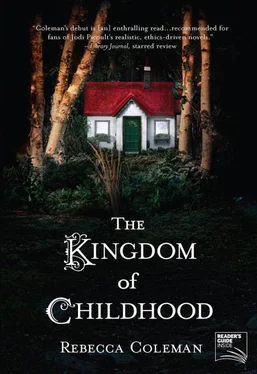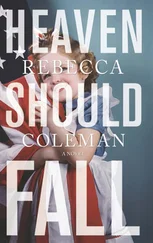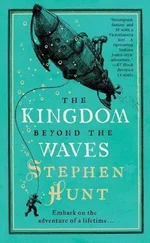Rebecca Coleman - The Kingdom of Childhood
Здесь есть возможность читать онлайн «Rebecca Coleman - The Kingdom of Childhood» весь текст электронной книги совершенно бесплатно (целиком полную версию без сокращений). В некоторых случаях можно слушать аудио, скачать через торрент в формате fb2 и присутствует краткое содержание. Город: Ontario, Год выпуска: 2011, ISBN: 2011, Издательство: MIRA Books, Жанр: Современная проза, на английском языке. Описание произведения, (предисловие) а так же отзывы посетителей доступны на портале библиотеки ЛибКат.
- Название:The Kingdom of Childhood
- Автор:
- Издательство:MIRA Books
- Жанр:
- Год:2011
- Город:Ontario
- ISBN:978-1-4592-1383-8
- Рейтинг книги:5 / 5. Голосов: 1
-
Избранное:Добавить в избранное
- Отзывы:
-
Ваша оценка:
- 100
- 1
- 2
- 3
- 4
- 5
The Kingdom of Childhood: краткое содержание, описание и аннотация
Предлагаем к чтению аннотацию, описание, краткое содержание или предисловие (зависит от того, что написал сам автор книги «The Kingdom of Childhood»). Если вы не нашли необходимую информацию о книге — напишите в комментариях, мы постараемся отыскать её.
was a semifinalist in the 2010 Amazon Breakthrough Novel Competition. An emotionally tense, increasingly chilling work of fiction set in the controversial Waldorf school community, it is equal parts enchanting and unsettling and is sure to be a much discussed and much-debated novel.
The Kingdom of Childhood — читать онлайн бесплатно полную книгу (весь текст) целиком
Ниже представлен текст книги, разбитый по страницам. Система сохранения места последней прочитанной страницы, позволяет с удобством читать онлайн бесплатно книгу «The Kingdom of Childhood», без необходимости каждый раз заново искать на чём Вы остановились. Поставьте закладку, и сможете в любой момент перейти на страницу, на которой закончили чтение.
Интервал:
Закладка:
Zach observed, not for the first time, that it looked disconcertingly like orgasm, this business of labor. The momentum of moans, the forgetting of breath, the pinpoints of sweat—at the crux he could not help calling forth images of Judy and of Fairen, their open mouths, the tendons in their necks, the wild hair. It was as though pleasure and pain were not a spectrum but a wheel, and when a woman pushed past one end or fell back through the other side, she would find herself in the state of his mother. Into his mind flashed a quote from her studio chalkboard: The end of birth is death; the end of death is birth. Therefore grieve not for what is inevitable.
She screamed—a long, impossibly deep, animal sound—and swelled in a curl around the balled quilt. Rhianne waved a hand urgently, and Zach’s father climbed onto the bed and wound himself behind his wife. As he turned himself into a sort of seatback for her, Rhianne moved to the front of things, and Zach knew it was almost over. He unfolded himself from the chair and came forward, touching the tall bedpost, peering over Rhianne’s shoulder.
“Can you see from there?” Rhianne asked him, and as he nodded, his mother grimaced and groaned and arched back against his father. Rhianne laid a hand intimately on the inside of her thigh and said, “Shhh, there, you’re close now, so close.” His mother gritted her teeth, the muscles in her legs tensing and jumping, and Zach recalled Judy telling him Scott had been born at home, doubtless in a scene much like this one. Spontaneously he wondered how he could ever have presumed to know her, this woman who had traveled through time and pain in ways that seemed impossibly distant to him. She had borne Scott in her own bed, her darkly polished sleigh bed, and with him the chain of time that would bring Zach to that same place eighteen years later, his knees planted where her hips had been.
With that, his sister’s fuzzy head burst forth into the world in a gush of water, mouth agape, fat limbs flailing, streaked in blood and greeted with their mother’s sudden turnabout laughter. And this, Zach thought, was the natural order, indeed: love everywhere, and also, a terrible mess.
31
When his body wrapped around mine, I felt safe. Behind me, chest to back, leg to leg, he became the opposite of a shadow: a stronger, larger, taller me who could not be bullied or broken. His hands cupping mine made a nest out of my palms, a promise that nothing would bite me, nor would I be allowed to crush what I held.
Once, I had imagined that in a jail cell I would curl on the bed and think of nothing but the beauty of Zach’s body. But as I fell asleep in the back of the police car my mind sought only those hours with Rudi, in the barn or shed, in the snow. Where the world was the fairy tale, and hard nightmares were the stuff of books and outposts where Jesus did not tread. As I drifted off, in my mind’s eye I sat on a straw bale and rested my cheek against Rudi’s arm while he paged through my book of moral tales, laughing at the absurdity of horror. The bare wooden walls marked the edges of my world just then. I was a good little girl, not a bad one, and I had never considered that a teacher might be wrong.
Seek out what’s beautiful, I had instructed Maggie, and love it before it rots. But I had been wrong. Beautiful men stay beautiful forever. That which is lovely remains so, preserved behind glass in one’s mind.
And so I carried it all with me, the beautiful and the terrible alike, to keep me company, and left the ordinary world.
ACKNOWLEGMENTS
With deep appreciation, I would like to acknowledge the individuals who walked with me along the path of writing this novel.
Stephany Evans, my wonderful agent, who had faith in my idea and my ability to bring it to light. Thank you.
Susan Swinwood and the team at MIRA Books, for believing in the manuscript, and for doing a stellar job in editing and taking it to market.
My first readers and tiny fan club: Amanda Skjeveland, Kathy Gaertner, Jassy Mackenzie, Sara Roseman, Randi Anderson (also known as Mom), Laura Wilcott, Hillary Myers, Elizabeth Gardner, Stephanie Cebula, Gary Presley—and a special thanks to Erica Hayes. I am also thankful to the judges and reviewers at the Amazon Breakthrough Novel Award who gave the book an approving nod.
D.S. and S., whose candid insights brought Zach and Judy to life in my mind.
I would like to express gratitude, amorphous though it may be, to the cities of Greenbelt, Maryland, and North Conway, New Hampshire, as well as to a certain little Waldorf school that welcomed my family when we were young and broke. I hope my fondness for each of you is visible in this text.
And finally, my husband, Mike, and all four of my children—for your sacrifices, for your patience and for the steady supply of caffeine, I thank you from the bottom of my heart.
We hope you enjoyed The Kingdom of Childhood, and that the following Questions for Discussion help to enhance your book club discussions.
QUESTIONS FOR DISCUSSION
1. The story is set in 1998 amidst the release of the Starr Report and President Clinton’s impeachment, and as the novel opens, there is intense discussion in the media about these subjects. Do you feel the “national conversation” about the Lewinsky affair opened avenues of discussion that would have been inappropriate for Zach and Judy otherwise?
2. The first few chapters of the novel show an increasingly skewed set of boundaries between Judy and Zach that allow the affair to occur. Did this seem realistic to you? Was the process of dissolving their boundaries similar to what happens in affairs between consenting adults?
3. The Waldorf school movement is an educational approach that is widely practiced around the world and yet little known outside those communities. Its philosophy extends beyond the classroom to the entire lifestyle of the families involved. How did you feel about the way of life Zach’s family, and the others in the story, have adopted? Did it seem appealing or too intrusive? Were there any aspects that stood out to you? Judy’s children, Scott and Maggie, both rebel from their upbringing in different ways. Did you blame them for rejecting the Waldorf way of life, or did it seem understandable?
4. Both Judy and Zach are influenced by experiences in which they are confronted with their parents’ sexual misdeeds. Each struggles to reconcile their idealized sense of their parent with their parent’s human failings. In what ways did you feel those experiences affected their choices with each other? In the case of Zach, did you feel that his mother’s affair made an affair with a middle-aged woman seem more natural to him, or only increased his level of guilt about his role in it?
5. In the flashback scenes, Judy’s mother is institutionalized due to mental illness, which leads to Judy’s father’s affair with Kirsten and her own isolation and dependence on Rudi. All of these factors set the stage for her later affair with Zach, which in turn leads to her own unraveling mental state toward the end of the story. Did you sense she was mentally ill throughout the novel, or did the stress of the affair cause her to “crack”? How did her family history of mental illness factor in to your impressions of or sympathy for Judy?
6. On the way back from Ohio, Zach and Judy discuss the song “Mrs. Robinson” and the idea of older women who pursue younger men. While society considers it “creepy” when an older man pursues a young girl, in popular culture it’s often held as funny or tantalizing when an older woman—a “cougar”—does the same with a young man. Do you agree that this double standard exists? Has your perspective changed after reading The Kingdom of Childhood?
Читать дальшеИнтервал:
Закладка:
Похожие книги на «The Kingdom of Childhood»
Представляем Вашему вниманию похожие книги на «The Kingdom of Childhood» списком для выбора. Мы отобрали схожую по названию и смыслу литературу в надежде предоставить читателям больше вариантов отыскать новые, интересные, ещё непрочитанные произведения.
Обсуждение, отзывы о книге «The Kingdom of Childhood» и просто собственные мнения читателей. Оставьте ваши комментарии, напишите, что Вы думаете о произведении, его смысле или главных героях. Укажите что конкретно понравилось, а что нет, и почему Вы так считаете.












